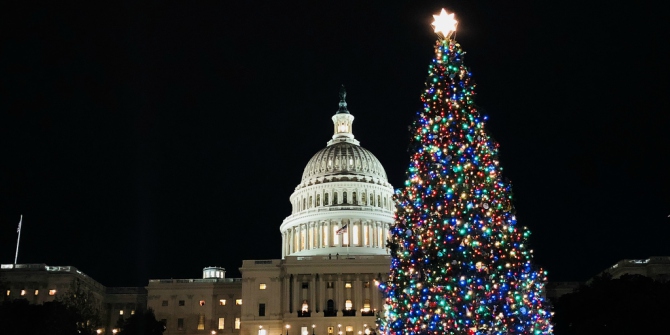This year, LSE USAPP has published hundreds of articles which have been read thousands of times. Here are our top ten most popular original articles by views published in 2015. Thanks to everyone for reading, and we look forward to bringing you the best in commentary and research on US politics and policy in 2016!
__________________________________
In Los Angeles, increasing neighborhood diversity means that segregation is on the decline.
 The makeup of American communities is changing – some communities are becoming more diverse, whilst others are becoming more segregated. In new research, William A.V. Clark, Eva Andersson, John Osth and Bo Malmberg examine trends in neighborhood diversity in Los Angeles since 2000. They find that only one third of people now live in strongly segregated neighborhoods, down from 40 percent in 2010, and that this increasing diversity has mainly been driven by the decline of homogenous white and black neighborhoods.
The makeup of American communities is changing – some communities are becoming more diverse, whilst others are becoming more segregated. In new research, William A.V. Clark, Eva Andersson, John Osth and Bo Malmberg examine trends in neighborhood diversity in Los Angeles since 2000. They find that only one third of people now live in strongly segregated neighborhoods, down from 40 percent in 2010, and that this increasing diversity has mainly been driven by the decline of homogenous white and black neighborhoods.
Cities that subsidize transit will get the best value for money in the absence of congestion pricing and bus lanes.

 Should urban authorities subsidize public transport systems? Many academics who have studied transport pricing disagree on the answer. In new research, which examines transit subsidies in London, UK, and Santiago, Chile, Leonardo Basso and Hugo Silva find that bus lanes, car congestion pricing, and subsidies can all be very effective in improving people’s welfare – but that adding an additional policy does not have as much of an effect as the first. They argue that policymakers who wish to help the poorest should put into place transit subsidies, as this will do the most to help the poor and redistribute incomes, compared to the alternatives.
Should urban authorities subsidize public transport systems? Many academics who have studied transport pricing disagree on the answer. In new research, which examines transit subsidies in London, UK, and Santiago, Chile, Leonardo Basso and Hugo Silva find that bus lanes, car congestion pricing, and subsidies can all be very effective in improving people’s welfare – but that adding an additional policy does not have as much of an effect as the first. They argue that policymakers who wish to help the poorest should put into place transit subsidies, as this will do the most to help the poor and redistribute incomes, compared to the alternatives.
Little Britain’s Big Election: a declining power that we should not shy away from
 Britain’s election is being watched closely in both the USA and Europe because of fears a once leading player in the Atlantic alliance has taken a back-seat in international affairs. Tim Oliver argues that while Britain is not about to disappear, it will play a more cautious role in the world, something that could be a strength rather than a weakness.
Britain’s election is being watched closely in both the USA and Europe because of fears a once leading player in the Atlantic alliance has taken a back-seat in international affairs. Tim Oliver argues that while Britain is not about to disappear, it will play a more cautious role in the world, something that could be a strength rather than a weakness.
Hiring more full-time federal bureaucrats will result in smaller and better government.
 The United States’ federal government has expanded greatly since the 1960s, with spending having increased by a factor of six in over that time. The number of federal employees, however, has not similarly increased, with present numbers close to those of the Reagan Administration and fewer than were present during Kennedy’s term. John J. DiIulio Jr writes that the federal government has become a Leviathan by Proxy, which gives billions of dollars and thousands of contracts to state and local governments, contractors, and non-profits. He argues that recent government problems such as the 2005 reaction to Hurricane Katrina and 2013’s Obamacare rollout show that the federal civil service is overloaded not bloated. In order to make government smaller and better, he calls for the hiring of one million more federal civil servants by 2035 and the introduction of better performance management practices.
The United States’ federal government has expanded greatly since the 1960s, with spending having increased by a factor of six in over that time. The number of federal employees, however, has not similarly increased, with present numbers close to those of the Reagan Administration and fewer than were present during Kennedy’s term. John J. DiIulio Jr writes that the federal government has become a Leviathan by Proxy, which gives billions of dollars and thousands of contracts to state and local governments, contractors, and non-profits. He argues that recent government problems such as the 2005 reaction to Hurricane Katrina and 2013’s Obamacare rollout show that the federal civil service is overloaded not bloated. In order to make government smaller and better, he calls for the hiring of one million more federal civil servants by 2035 and the introduction of better performance management practices.
Questioning the Logic of Broken Windows: Some People “See” More Local Incivilities than Others

 Many attribute New York’s massive fall in crime that began in the early 1990s to the implementation of the “broken windows” policing policy that sought to reduce “incivilities” – the social and physical indicators of neighborhood deterioration. In new research, Nathan W. Link and James M. Kelly examine the common wisdom that urban incivility leads to fear of crime. They argue that some people can be more “tuned in” to incivilities in their environment than others, and that those who are more generally fearful perceive greater incivilities.
Many attribute New York’s massive fall in crime that began in the early 1990s to the implementation of the “broken windows” policing policy that sought to reduce “incivilities” – the social and physical indicators of neighborhood deterioration. In new research, Nathan W. Link and James M. Kelly examine the common wisdom that urban incivility leads to fear of crime. They argue that some people can be more “tuned in” to incivilities in their environment than others, and that those who are more generally fearful perceive greater incivilities.
Urban sprawl costs the American economy more than $1 trillion annually. Smart growth policies may be the answer.
 The rapid urbanization of populations across the world has led to the growth of urban sprawl, which has in turn had many negative social and economic impacts. In new research in partnership with LSE Cities, Todd Litman, investigates the problems of urban sprawl and explores potential solutions. He finds that this sprawl costs the American economy more than $1 trillion every year, and argues that this may be reduced by encouraging market-based reforms to encourage smart growth strategies.
The rapid urbanization of populations across the world has led to the growth of urban sprawl, which has in turn had many negative social and economic impacts. In new research in partnership with LSE Cities, Todd Litman, investigates the problems of urban sprawl and explores potential solutions. He finds that this sprawl costs the American economy more than $1 trillion every year, and argues that this may be reduced by encouraging market-based reforms to encourage smart growth strategies.
Expanding Medicaid may also help to improve the coverage of Obamacare’s health insurance exchanges
 An important part of the 2010 Affordable Care Act was the expansion of Medicaid – something which 30 states have taken up. In new research, Jeffrey Clemens finds that not only does expanding Medicaid benefit those who gain coverage; it may also help to improve the performance of Obamacare’s health insurance exchanges. Since those eligible for Medicaid tend to have higher than average health expenses than most on the exchanges, drawing these individuals out of the exchanges means lower premiums for those that use them, making them less likely to opt-out.
An important part of the 2010 Affordable Care Act was the expansion of Medicaid – something which 30 states have taken up. In new research, Jeffrey Clemens finds that not only does expanding Medicaid benefit those who gain coverage; it may also help to improve the performance of Obamacare’s health insurance exchanges. Since those eligible for Medicaid tend to have higher than average health expenses than most on the exchanges, drawing these individuals out of the exchanges means lower premiums for those that use them, making them less likely to opt-out.
The overuse of suspension in American public schools threatens the success of all students
 In 2010, over 3 million children were suspended from U.S. schools, with black and Latino youth disproportionately affected. In new research, Brea L. Perrylooks at the consequences of what has become a widespread punishment for young adults. By using records of school suspensions and academic achievement, she finds that suspensions are used as a punitive response to negative behavior, rather than to keep schools safer, and that their use does not improve the learning environment for any students. She also finds that suspensions are particularly harmful to students’ academic achievement if they are used without restraint and in schools with lower levels of student violence.
In 2010, over 3 million children were suspended from U.S. schools, with black and Latino youth disproportionately affected. In new research, Brea L. Perrylooks at the consequences of what has become a widespread punishment for young adults. By using records of school suspensions and academic achievement, she finds that suspensions are used as a punitive response to negative behavior, rather than to keep schools safer, and that their use does not improve the learning environment for any students. She also finds that suspensions are particularly harmful to students’ academic achievement if they are used without restraint and in schools with lower levels of student violence.
Trees, a new partner in the fight against urban crime
 Crime is a persistent problem in many urban areas, both large and small. In new research, Kate Gilstad-Hayden and Spencer R. Meyer examine the effects of tree cover on this crime. They find that for every 10 percent increase in tree canopy cover, there was a 15 percent decrease in the violent crime, and a 14 percent fall in the property crime rate. Trees, they write, can help to increase ‘eyes on the street’ through recreational use, reduce mental the fatigue which can lead to crime, and offer landscaping opportunities which act as a ‘cue to care’.
Crime is a persistent problem in many urban areas, both large and small. In new research, Kate Gilstad-Hayden and Spencer R. Meyer examine the effects of tree cover on this crime. They find that for every 10 percent increase in tree canopy cover, there was a 15 percent decrease in the violent crime, and a 14 percent fall in the property crime rate. Trees, they write, can help to increase ‘eyes on the street’ through recreational use, reduce mental the fatigue which can lead to crime, and offer landscaping opportunities which act as a ‘cue to care’.
Campaign finance laws that make small donations public may lead to fewer people contributing and to smaller donations.
 In the American states, campaign finance laws require disclosure of private information for contributors at relatively low thresholds ranging from $1 to $300. The Internet has made it relatively easy to publicize such information in a way that changes the social context for political participation. Ray La Raja looks at how public disclosure of campaign contributions affects citizens’ willingness to give money to candidates. Drawing on social influence theory, his analysis suggests that citizens are sensitive to divulging private information, especially those who are surrounded by people with different political views. He shows that individuals refrain from making small campaign contributions or reduce their donations to avoid disclosing their identities.
In the American states, campaign finance laws require disclosure of private information for contributors at relatively low thresholds ranging from $1 to $300. The Internet has made it relatively easy to publicize such information in a way that changes the social context for political participation. Ray La Raja looks at how public disclosure of campaign contributions affects citizens’ willingness to give money to candidates. Drawing on social influence theory, his analysis suggests that citizens are sensitive to divulging private information, especially those who are surrounded by people with different political views. He shows that individuals refrain from making small campaign contributions or reduce their donations to avoid disclosing their identities.
Shortened url for this article: http://bit.ly/1MH0z6x
Featured image credit: Leo Reynolds (Flickr, CC-BY-NC-SA-2.0)






